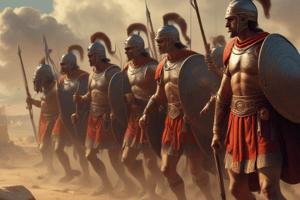Podcast
Questions and Answers
When was Carthage founded?
When was Carthage founded?
- 8th Century BCE
- 9th Century BCE (correct)
- 6th Century BCE
- 11th Century BCE
What contributed to Carthage's prosperity and expansion?
What contributed to Carthage's prosperity and expansion?
- Innovation in pottery making
- Progress in textile manufacturing
- Advancements in agriculture, fishing, and metal extraction (correct)
- Advancements in shipbuilding
What led to Carthage losing considerable influence in the Mediterranean trade network?
What led to Carthage losing considerable influence in the Mediterranean trade network?
- Natural disasters affecting the city
- Political instability within Carthage
- The First Punic War (correct)
- Loss of skilled artisans
What symbolized Carthage's military might?
What symbolized Carthage's military might?
In response to Rome's growing authority, what did Carthage do to prepare for another showdown?
In response to Rome's growing authority, what did Carthage do to prepare for another showdown?
Which military leader demonstrated Carthage's military prowess by marching from Spain to Italy with war elephants?
Which military leader demonstrated Carthage's military prowess by marching from Spain to Italy with war elephants?
What is the meaning of the famous phrase 'Hannibal is at the gates'?
What is the meaning of the famous phrase 'Hannibal is at the gates'?
How did the Second Punic War end for Rome?
How did the Second Punic War end for Rome?
Who led the Romans to destroy Carthage in 146 BCE?
Who led the Romans to destroy Carthage in 146 BCE?
What role did Carthaginians play in the Mediterranean trade network despite their defeat?
What role did Carthaginians play in the Mediterranean trade network despite their defeat?
What do the archaeological ruins of Carthage reveal about the ancient empire?
What do the archaeological ruins of Carthage reveal about the ancient empire?
Who founded the city of Carthage in the 9th century BCE?
Who founded the city of Carthage in the 9th century BCE?
What contributed significantly to Carthage's wealth and prosperity?
What contributed significantly to Carthage's wealth and prosperity?
What led to the outbreak of the First Punic War between Carthage and Rome?
What led to the outbreak of the First Punic War between Carthage and Rome?
What was a significant strategic move made by Carthage before the Second Punic War?
What was a significant strategic move made by Carthage before the Second Punic War?
What was the feat that allowed Hannibal to march from Spain to Italy with an army?
What was the feat that allowed Hannibal to march from Spain to Italy with an army?
Flashcards are hidden until you start studying
Study Notes
- Carthage, located in modern-day Tunisia, was the largest and most influential political entity in the Mediterranean before the Punic Wars with Rome.
- Founded by Phoenician Queen Elissa (Dido) in 9th Century BCE, Carthage grew significantly after Tyre's decimation and became the center of Phoenician trade.
- Advancements in agriculture, fishing, and metal extraction contributed to Carthage's prosperity and expansion, making it a cultural hegemon over its areas of influence.
- Carthage's navy, with 220 docks and state-of-the-art fleet, symbolized its military might and allowed control over the western Mediterranean.
- The First Punic War (275-241 BCE) between Rome and Carthage over Sicily resulted in Carthage relinquishing control of the island and losing considerable influence in the Mediterranean trade network.
- Between the first and second Punic Wars, Carthage suspected Rome's intent to exert more authority and prepared for another showdown by forming a base in Spain.
- Hannibal's daring overland journey from Spain to Italy, with an army and war elephants, demonstrated military prowess and forced Rome to focus on sea power.
- The Second Punic War (218-201 BCE) ended in a complete triumph for Rome, but Carthage's commercial interests revived in the 2nd century BCE.
- The Romans' conviction to destroy Carthage led to its downfall by 146 BCE, but it left a significant legacy in transferring goods, ideas, and culture throughout the Mediterranean.
- Carthage was a complex ancient empire with a priority for making money and generating trade, but it also had a rich culture and art that deserves further exploration.
Studying That Suits You
Use AI to generate personalized quizzes and flashcards to suit your learning preferences.





